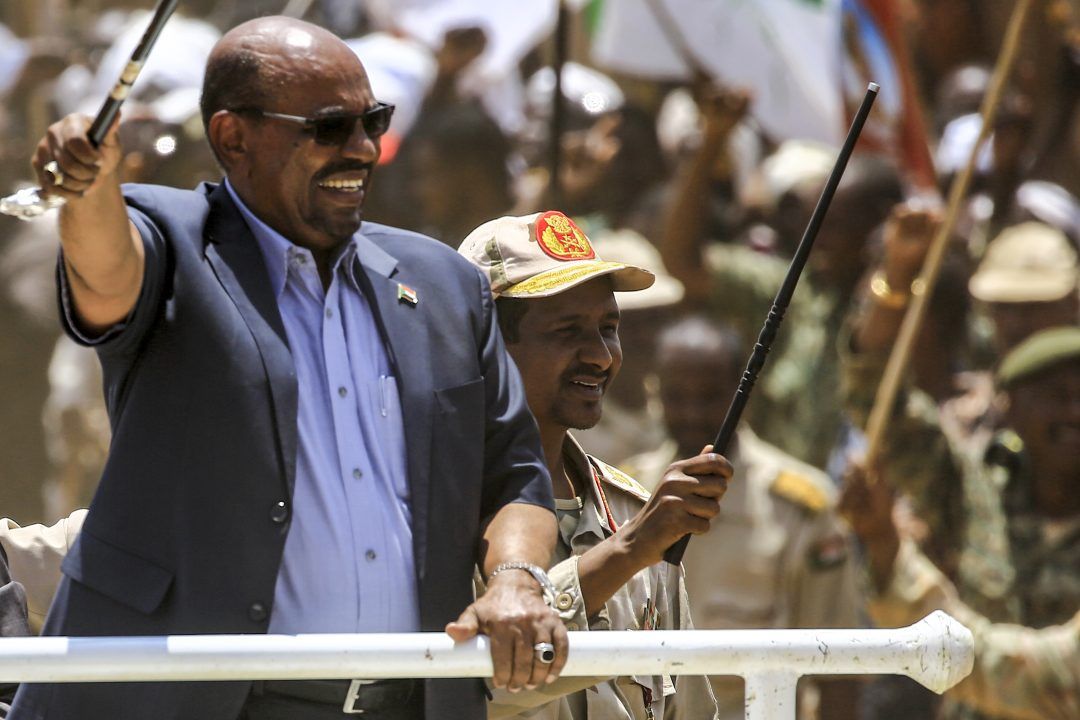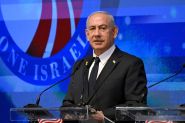- Home
- Middle East
- Sudan Peace Talks Begin in Switzerland

©September 23, 2017, Sudanese President Omar al-Bashir (L) waves a walking stick as he tours in a vehicle with the commander of the Rapid Support Forces (RSF) paramilitaries Mohamed Hamdan Daglo. (Photo by ASHRAF SHAZLY / AFP)
US-sponsored talks on agreeing to a ceasefire in the devastating conflict in Sudan kicked off in Switzerland on Wednesday, despite the Sudanese government staying away.
War has been raging since April 2023 between the Sudanese army under the country's de facto ruler Abdel Fattah al-Burhan and the paramilitary Rapid Support Forces (RSF), led by his former deputy Mohamed Hamdan Daglo.
The brutal conflict has triggered one of the world's worst humanitarian crises.
While the RSF is taking part in the talks, the Sudanese armed forces (SAF) are unhappy with the format arranged by Washington.
The talks, which could last up to 10 days, are being held behind closed doors in an undisclosed location in Switzerland.
They are co-hosted by Saudi Arabia and Switzerland, with the African Union, Egypt, the United Arab Emirates and the United Nations acting as a steering group.
Sudanese Media Minister Graham Abdelkader said ahead of the talks that the government was rejecting "any new observers or participants" – after Washington "insisted on the participation of the United Arab Emirates as an observer."
The Sudanese army has repeatedly accused the UAE of backing the RSF.
Without the SAF, other attendees will press on with the talks' agenda.
The fighting has forced one in five people to flee their homes, while tens of thousands have died. More than 25 million across the country – more than half its population – face acute hunger.
Previous talks in the Saudi city of Jeddah came to nothing.
Ramtane Lamamra, UN Secretary-General Antonio Guterres' personal envoy for Sudan, held separate meetings in Geneva last month with the warring parties to discuss humanitarian aid and the protection of civilians.
Alan Boswell, the Horn of Africa project director at the International Crisis Group, said Burhan was facing "serious internal divisions" as some in his camp are in favor of talks and others are "fiercely opposed."
Notably, with the United States in charge, and with the presence of Saudi Arabia, the UAE and Egypt, "that puts all the main outside actors with leverage over the warring parties in one room together," he added.
A government no-show leaves Burhan under mounting external pressure, if he is seen as "the main obstacle to ending the war," Boswell said.
Cameron Hudson, from the Center for Strategic and International Studies' (CSIS) Africa program, said Washington had "tried to create the illusion of momentum" to force the SAF's hand, "but it was a bluff and the SAF saw through it."
"They know that Washington does not have the stomach to impose real consequences on them for non-compliance," he told AFP. There has been no let-up in the fighting.
The Emergency Lawyers – a group of volunteer lawyers who have documented human rights violations during the war – reported "increased indiscriminate artillery shelling by the RSF on civilian areas" this week, particularly in El-Fasher and Omdurman, where they report strikes on a school, a bus carrying civilian passengers and a hospital.
Robin Millard, with AFP
War has been raging since April 2023 between the Sudanese army under the country's de facto ruler Abdel Fattah al-Burhan and the paramilitary Rapid Support Forces (RSF), led by his former deputy Mohamed Hamdan Daglo.
The brutal conflict has triggered one of the world's worst humanitarian crises.
While the RSF is taking part in the talks, the Sudanese armed forces (SAF) are unhappy with the format arranged by Washington.
Humanitarian Access
The talks, which could last up to 10 days, are being held behind closed doors in an undisclosed location in Switzerland.
They are co-hosted by Saudi Arabia and Switzerland, with the African Union, Egypt, the United Arab Emirates and the United Nations acting as a steering group.
Sudanese Media Minister Graham Abdelkader said ahead of the talks that the government was rejecting "any new observers or participants" – after Washington "insisted on the participation of the United Arab Emirates as an observer."
The Sudanese army has repeatedly accused the UAE of backing the RSF.
Without the SAF, other attendees will press on with the talks' agenda.
The fighting has forced one in five people to flee their homes, while tens of thousands have died. More than 25 million across the country – more than half its population – face acute hunger.
Pressure on Burhan
Previous talks in the Saudi city of Jeddah came to nothing.
Ramtane Lamamra, UN Secretary-General Antonio Guterres' personal envoy for Sudan, held separate meetings in Geneva last month with the warring parties to discuss humanitarian aid and the protection of civilians.
Alan Boswell, the Horn of Africa project director at the International Crisis Group, said Burhan was facing "serious internal divisions" as some in his camp are in favor of talks and others are "fiercely opposed."
Notably, with the United States in charge, and with the presence of Saudi Arabia, the UAE and Egypt, "that puts all the main outside actors with leverage over the warring parties in one room together," he added.
A government no-show leaves Burhan under mounting external pressure, if he is seen as "the main obstacle to ending the war," Boswell said.
No Let-Up in Fighting
Cameron Hudson, from the Center for Strategic and International Studies' (CSIS) Africa program, said Washington had "tried to create the illusion of momentum" to force the SAF's hand, "but it was a bluff and the SAF saw through it."
"They know that Washington does not have the stomach to impose real consequences on them for non-compliance," he told AFP. There has been no let-up in the fighting.
The Emergency Lawyers – a group of volunteer lawyers who have documented human rights violations during the war – reported "increased indiscriminate artillery shelling by the RSF on civilian areas" this week, particularly in El-Fasher and Omdurman, where they report strikes on a school, a bus carrying civilian passengers and a hospital.
Robin Millard, with AFP
Read more



Comments